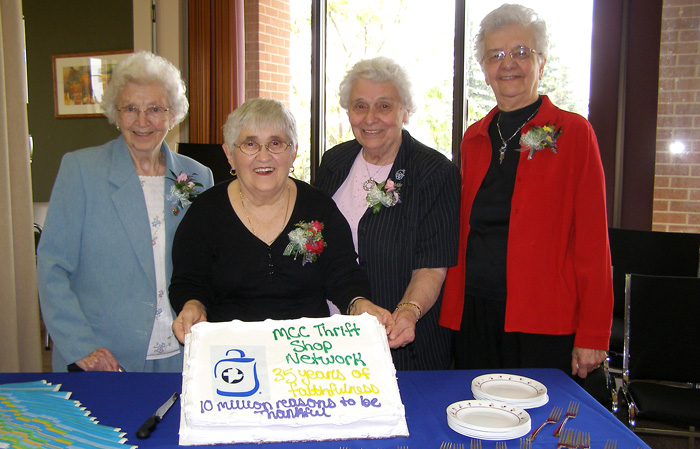Village News
Our Mustard Seed Has Turned Into a Big Tree

Early in 1972 Mennonite Central Committee (MCC) made the decision to reduce its overseas shipments of used clothing and household goods and women at home took action. That spring, Linie Friesen, Selma Loewen, Susan Giesbrecht, and Sara Stoesz, all of Altona, Manitoba, came up with a plan to use the resources available to them to make a difference. They would continue to gather used household items but, rather than sending them overseas, they would sell the goods locally and give the proceeds to MCC. From that small beginning, the first MCC Thrift Shop was born. The Steinbach MCC Thrift Shop officially opened a month later, in April 1972. By 1978, thirty thrift shops had opened in Canada, with twenty-six more throughout the United States.
Mennonite Heritage Village’s (MHV) exhibit for 2020, MCC 100 Years, commemorates the 100th anniversary of MCC. Someone asked me, shortly after the exhibit opened in June, what I had learned through making the exhibit. The more I thought about it, the more it stood out to me that there was a common thread that was woven through the exhibit: that individuals can make a difference in the world, even when these ideas have very small beginnings. The history of the MCC network of thrift shops is perhaps my favourite example of this theme.
At the time they were founded in the 1970s, Mennonite women were gradually beginning to have some positions on church committees or boards, but they were still not widely accepted as leaders in the church or in their communities. Nonetheless these four women in Altona, and others like them, had an idea they were convinced would make a difference and put considerable effort and skill into achieving their goals. In Steinbach, for example, Agatha Friesen gathered a group of women together to create the MCC thrift shop in Steinbach, an endeavour that would involve four moves in their first three years of operation. Years later, Friesen remembered these early years and the need to find an appropriate building for the thrift shop, which proved difficult. She commented: “The ladies suggested closing down. I was frustrated but not defeated. I bravely ventured out to the Credit Union to see if I could get a small loan. I went there by myself. Whomever I approached probably sighed and chuckled – a woman, depending on used clothing for income.” (Gladys Terichow, From Old to Gold: Stories from the Steinbach MCC Thrift Shop, p. 11) She succeeded in securing a $27,000 loan and with that, they purchased a lot and built a new building to house the thrift shop at 477 Main Street in 1974. Sometime later, when Friesen appealed to Steinbach’s town council for permission to move an old MCC thrift shop building onto the lot behind their newest location to provide space to make soap to wash the clothes donated to the shop, she ended her petition with weighty words: “We don’t want to be liberated women but we do want to be heard.” (Terichow, From Old to Gold, p. 18) The MCC thrift shop movement was begun by women who thought they could make a difference and, like Friesen suggests in her memory of getting their first loan for a building and in her petition to council, fought to be taken seriously in their work.
Today there are over one hundred MCC Thrift Shops in North America. These shops are testaments to the power and efforts of those women who first established the thrift shops and then organized the leadership of them, purchased or rented facilities, managed the shops, and provided thousands of hours of volunteer labour staffing them. The legacy of these women is that these shops have kept thousands of pounds of goods out of landfills and have given millions of dollars in proceeds to MCC. In 2019 alone, revenues from MCC thrift shops in Canada and the U.S. contributed over $19 million to MCC’s work around the world and at home. As Linie Friesen exclaimed, when thinking about the network of MCC thrift shops years later, “It’s unbelievable – our mustard seed has turned into a big tree and it is still growing.”
MCC 100 Years proudly features the history of MCC thrift shops and the work of these founding women. The exhibit is on display in the Gerhard Ens Gallery until April 1, 2021.




